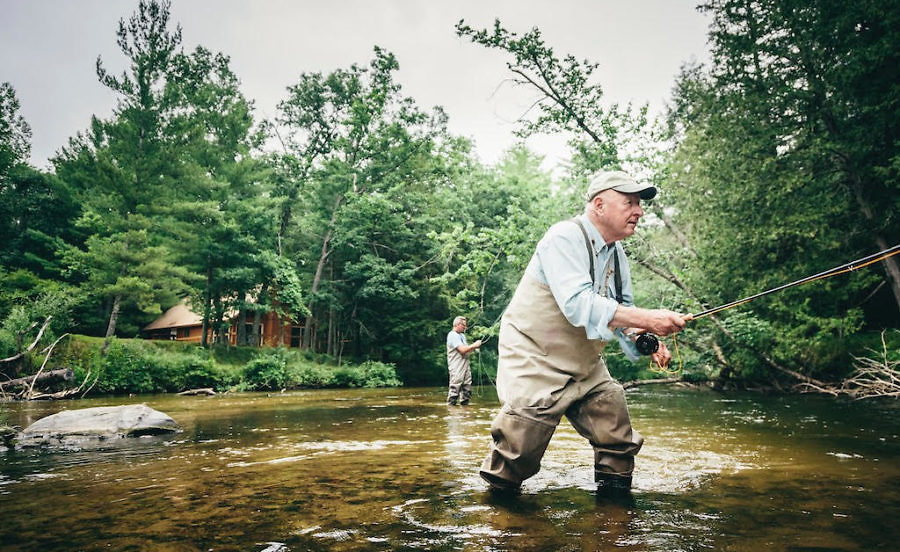
The other side of the Aleutian Peninsula.
by Miles Nolte
ON A BLUFF OVERLOOKING A TIDAL ESTUARY, three guides sit on patched plastic chairs playing music. They’re on a flat space cleared of brush and alders, fine reddish dirt tamped into an outdoor living room. There’s a surprisingly flat and sturdy driftwood table at the center, its weathered gray boards lined with treasure: pocked brown bear skulls sprouting moss, half a moose jawbone, seashells and sand dollars, black fossils stamped in shards of shale.
Behind the men, a volcanic valley yawns. Fifteen miles to the north, Mount Chiginagak rises 7,000 feet, topped by a snowy glacier, stark white and glowing blue. It feeds the river that empties into the tidal flat below. The men’s music competes with the bleat of gulls and the splashing of salmon in the low tide flow.
It’s generally a three-man band—two guitarists, one doubling as a singer; a percussionist shaking a plastic egg, fully clad in camo—but a harmonica player sits in sporadically. They play some covers from The Band, The Wood Brothers, Neil Young, and mix in some originals about living in isolation on Nakalilok Bay, thousands of miles from friends and family.
Living and working here require sacrifice: once a week, mail is flown in. Mixed with the routine updates, the occasional letter carries news of a friend whose funeral will be missed, a significant other grown weary of the distance, maybe a care package with stale cookies to be savored.
Tundra gave way to Becharof Lake, the second-largest freshwater lake in Alaska, the edge of which boils with sulfurous volcanic release.
The men don’t come here for money; they could make more guiding in the Lower 48, and sleep in walled houses with mattresses and Internet access. They come back year after year for the same reason that guests gladly pay the lodge thousands of dollars a week: to be here, in this place.
Although I worked at a lodge in Alaska and have visited several others, I’ve never seen anything like Epic Angling & Adventure’s Wilderness Safari Camp. I guided on a river that drained into Bristol Bay, a place famous for its rainbow trout and salmon fishing. The drainages that feed Bristol Bay from the north abound with fish, but they’re also well stocked with fly-out lodges and anglers. Some of the better-known trout streams—the Moraine, American, Brooks—can have lines of parked floatplanes in the high season. The fishing is usually excellent, but solitude can be difficult to come by. This camp sits alone. The nearest village is Ugashik, 80 miles away by helicopter. Or, if the weather and tides are good, bush plane.
I came in by helicopter from King Salmon on a Saturday with my mouth agape. Tundra gave way to Becharof Lake, the second-largest freshwater lake in Alaska, the edge of which boils with sulfurous volcanic release. We flew over the Ukinrek Maars, two ashen craters created in 1977 when subterranean magma touched the aquifer and for 11 days launched steam and debris into the sky. Volcanologists think it’s stable now.
Southwest of the lake are the Aleutian mountains, and we climbed through a pass carved by flowing water; the river coursed red with sockeye salmon. One caribou bull tucked into the landscape. All that gave him away was his expansive rack subtly turning as he watched us motor overhead.
The Pacific Ocean lies beyond the mountains. We followed the coast, flying over headlands and bays bearded with kelp, until we reached the camp. I was satisfied with my trip already, and I hadn’t even strung a rod. The two-day journey from Montana to Washington to Oregon to Anchorage to King Salmon was worth it, just for that helicopter ride.
But, of course, I did fish. Within a couple hours of arrival, I was standing in the estuary on an incoming tide, catching chum and pink salmon on nearly every cast. Though the conditions weren’t ideal—high winds with an incoming tide—I switched to topwater flies, just to see if I could. My catch rate declined, but I spent the afternoon watching fish slash and boil behind a pink Pollywog. Their teeth shredded the foam body; one completely bit off the rabbit-strip tail. It didn’t matter. Fish after fish took its turn trying to mutilate this gaudy intruder interrupting their upstream journey.
